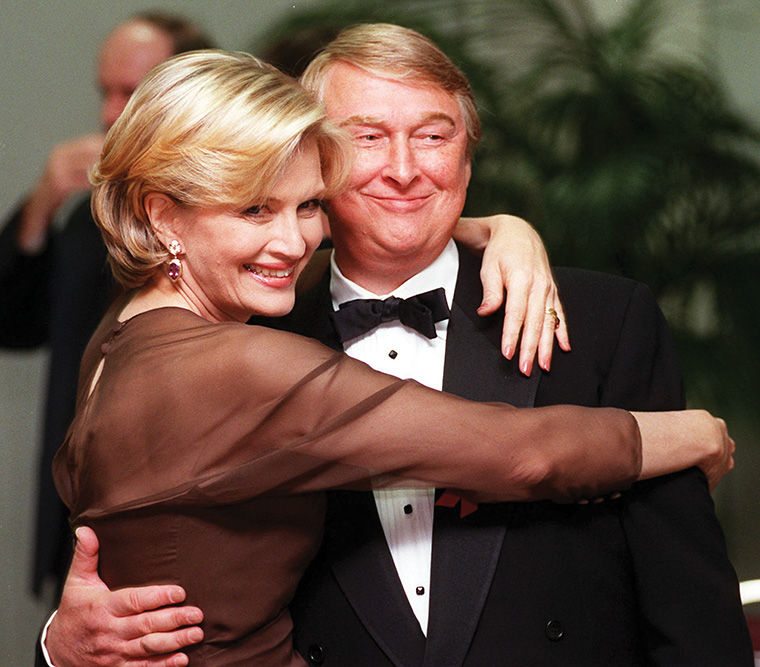‘The Graduate’ director, comedy legend Mike Nichols dead at 83
Photo Courtesy of Associated Press
Film director Mike Nichols dances with his wife Diane Sawyer. Nichols directed notable films such as 1966’s “Who’s Afraid of Virginia Woolf?” and 1969’s “The Graduate.”
November 24, 2014
Few American filmmakers have stormed the gates and rattled the nerves of the film industry in the same way young provocateur Mike Nichols did.
After honing his craft as one half of the quirky comedy act Nichols and May, Nichols, who died Nov. 19 at 83, shot like a cannon to prominence with his very first film directing effort in a 1966 adaptation of Edward Albee’s scathing domestic drama “Who’s Afraid of Virginia Woolf?” with real-life battling couple Richard Burton and Elizabeth Taylor playing as the leads. Nominated for 13 Academy Awards and a winner of five, including best actress for a triumphant Taylor, “Who’s Afraid of Virginia Woolf?” tore down the boundaries of what was allowed to be said in a mainstream American movie at the time.
Nichols then stunned an in-transition film world with his follow-up, the ribald, incredibly resonant and, most of all, relevant, post-Eisenhower generation coming-of-age film “The Graduate.” Starring a young Dustin Hoffman as Benjamin Braddock, a feckless middle- class college graduate, and a great Anne Bancroft as the sexy Mrs. Robinson, a married, middle-aged temptress who seduces the young man, the film boasted a chart-busting soundtrack by Simon & Garfunkel and became a rite of passage for an entire generation of young American filmgoers, many of whom yearned for an Alpha-Romeo Spider of their own, just like Ben’s.
Nichols, born in Berlin and raised in New York City, was one of the few American artists to win an Academy Award, a Tony, a Grammy and an Emmy. He scored one of the latter for his magnificent HBO adaptation of Tony Kushner’s Pulitzer Prize-winning play “Angels in America,” with Meryl Streep as Ethel Rosenberg. Nichols and Streep also worked earlier together on “Silkwood,” an Academy Award-winning 1983 drama about nuclear industry whistle-blower Karen Silkwood, and “Heartburn,” a 1986 film adaptation of a famously bitter autobiographical novel about divorce by journalist and future BAFTA award-winning writer/director Nora Ephron.
Nichols’ momentum faltered after his 1970 adaptation of “Catch-22,” Joseph Heller’s classic anti-war novel, failed at the box office in spite of an ensemble cast featuring Alan Arkin, Richard Benjamin, Art Garfunkel, Bob Newhart, Anthony Perkins, Paula Prentiss and Orson Welles.
Nichols scored a comeback with “Carnal Knowledge,” a provocative 1971 take on sex American-style, written by Jules Feiffer, co-starring Jack Nicholson, another actor Nichols frequently worked with, Garfunkel, Ann-Margret and Candice Bergen. “Carnal Knowledge” did for sex what “Who’s Afraid of Virginia Woolf?” did for profanity. Nichols faltered again with the science-fiction thriller “The Day of the Dolphin” and the comedy “The Fortune” with veteran Warren Beatty and Nicholson.
With his brain always half in the American theater, Nichols made several noteworthy screen adaptations of plays. The best of these is his award-winning 2003 two-part adaptation of “Angels in America,” an epic and drama, gazing deeply into a dark, damaged American psyche and ripping away any illusions viewers might have about the impact of the 1980s-era AIDs epidemic. Also noteworthy are “Working Girl,” “The Birdcage” and the 2007 Aaron Sorkin-penned, Tom Hanks’ starrer “Charlie Wilson’s War.”
Nichols is survived by his wife, ABC News anchor Diane Sawyer, children Daisy, Max and Jenny, and four grandchildren. Here’s to you, Mr. Nichols.








